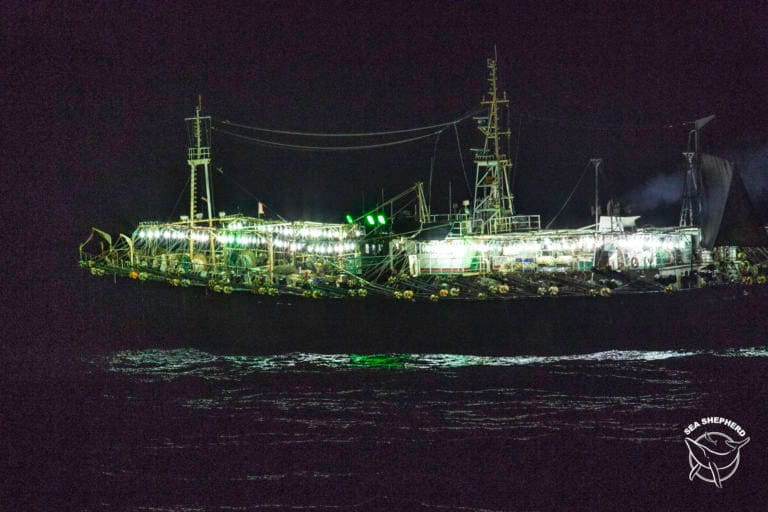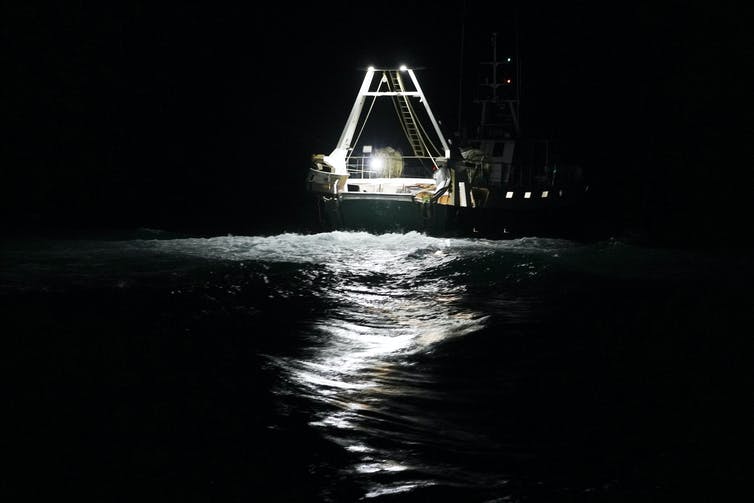Latin America
Related: About this forumIllegal fishing by massive Chinese fleet costs South American countries 8% to 15% of their catch
Oct 11, 2023 |
The Chinese fishing fleet has the worst reputation for illegal, unreported and unregulated (IUU) fishing globally. It is notorious in South America. Nearly a third of its 3,000 ships operate in the region all year. Chasing migratory squid, they spend the first six months plundering the Atlantic waters off Argentina and the next six hoovering their Pacific catch near Ecuador and Peru, having gone around Chile’s Strait of Magellan.

A Chinese fishing trawler operating near the Galapagos in 2020.
In the past decade, IUU fishing has depleted global stocks. It generates up to $36bn per year and accounts for one in every five fish eaten globally. That makes it the world’s sixth-largest illicit industry. In South America, IUU fishing strips countries of 8-15% of their annual catch, according to research by the American University in Washington. China accounts for three-quarters of foreign vessels in those waters.
The fleet is currently off Ecuador’s coast.
Ecuador, Peru, the United States, and 11 other countries concluded their latest exercise against IUU fishing on September 30. They practiced intercepting ships to combat illegal fishing.
Ecuador and Peru have also built a coalition to address regional IUU fishing, recruiting Chile, Colombia, Panama, and Costa Rica. These countries publicly condemned China’s incursion in 2020. iN 2021M they pledged to link their marine protected areas to form the world’s largest reserve, twice the size of Britain. Their governments lobbied the World Trade Organization for an agreement to cut fishing subsidies, which was adopted in 2022.
The US Coastguard began patrolling with Ecuador’s navy in 2020. Since 2022, the US State Department HAS allocated nearly $30m for anti-IUU fishing programs.
More:
https://cuencahighlife.com/illegal-fishing-by-massive-chinese-fleet-costs-south-american-countries-8-to-15-of-their-catch/

A Chinese ship fishing off the west coast of South America in July 2021.Credit...Isaac Haslam/Sea Shepherd, via Associated Press

Chinese vessel Hua Xiang 801 as its being fired on by Argentine coast guard ship and maneuvering to get away. March 3 2019 | Photo: Noticias Argentinas

A Chinese fishing vessel working at night. Image by Simon Ager/Sea Shepherd.


Irish_Dem
(57,435 posts)That nothing belongs to any single country.
So what everyone else has belongs to them.
Judi Lynn
(162,379 posts)about it. I started reading articles about them out there, so close to land, and they won't go away. Really brazen people.
Then there's Japan and the disappearing whales, too! They've been begged to stop for years by many nations. More of the same, it seems.
Too many Trumps in the world.
Irish_Dem
(57,435 posts)That the US is selfish and greedy to keep it all to themselves.
That is why stealing it is OK.
Just like everything else they steal.
Judi Lynn
(162,379 posts)AI·6 min read
Thousands of ocean fishing boats could be using forced labor – we used AI and satellite data to find them
21 December 2020

Fishing on the high seas is a bit of a mystery, economically speaking. These areas of open ocean beyond the territorial jurisdiction of any nation are generally considered high-effort, low-payoff fishing grounds, yet fishers continue to work in them anyway.
I am an environmental data scientist who leverages data and analytical techniques to answer critical questions about natural resource management. Back in 2018, my colleagues at the Environmental Market Solutions Lab found that high-seas fishing often appears to be an almost entirely unprofitable endeavor. This is true even when taking government subsidies into consideration.
Yet fishers continue to harvest on the high seas in staggering numbers, suggesting that this activity is being financially supported beyond just government subsidies.
Forced labor is a known problem in open ocean fishing, but the scale has been very hard to track historically. This mystery – why so many vessels are fishing the high seas if it isn’t profitable – got our team thinking that maybe many of these vessels are, in a sense, being subsidized through low labor costs. These costs could even be zero if the vessels were using forced labor.
By combining our team’s data science expertise with satellite monitoring, input from human rights practitioners and machine learning algorithms, we developed a way to predict if a fishing vessel was at high risk of using forced labor. Our study shows that up to 100,000 individuals may have been victims of forced labor between 2012 and 2018 on these ships.
Long trips, long hours and traveling long distances are all signs that a vessel is using forced labor.
More:
https://techandsciencepost.com/news/tech/computerscience/ai/thousands-of-ocean-fishing-boats-could-be-using-forced-labor-we-used-ai-and-satellite-data-to-find-them/
I believe this has been happening far longer than has been known in the West. There was an incident which happened in the late 1970's, when a Chinese sailor was discovered living outdoors in South America. They found an interpreter who asked him how he was homeless and he said that his ship went off and left him. He explained he had been taking armadillos to eat as food, describing them as "the little pigs nobody wanted."
My mother was overwrought with sorrow for this man, and when I found out I was unable to forget it, too. I could easily see how a ship would abandon him if it was trying to avoid being found with conscripted laborers on board!
Bayard
(24,145 posts)Where the aliens use up every natural resource on a planet, and then move on to the next one.
sanatanadharma
(4,074 posts)Chinese fishing encroachment within the territorial waters of Uruguay. Or so I (try to) read locally.
CanonRay
(14,859 posts)Stop them, board them, arrest everyone, seize the boats. If the run, sink them. The Chinese are trying to tie up the oceans for their own benefit.